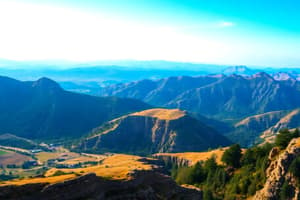Podcast
Questions and Answers
Which branch of geography primarily focuses on human activities and their relationship with the environment?
Which branch of geography primarily focuses on human activities and their relationship with the environment?
- Human Geography (correct)
- Physical Geography
- Geographical Techniques
- Environmental Geography
What type of geographic region is defined by official boundaries?
What type of geographic region is defined by official boundaries?
- Cultural Region
- Vernacular Region
- Formal Region (correct)
- Functional Region
Which of the following is NOT considered a key concept in geography?
Which of the following is NOT considered a key concept in geography?
- Movement
- Human-Environment Interaction
- Population Density (correct)
- Location
Which of the following describes the study of landforms and natural processes?
Which of the following describes the study of landforms and natural processes?
Which tool is primarily used for analyzing and managing spatial data?
Which tool is primarily used for analyzing and managing spatial data?
Climate zones are categorized as which type of geography?
Climate zones are categorized as which type of geography?
Which geographic technique involves collecting data via satellite imagery?
Which geographic technique involves collecting data via satellite imagery?
What is the primary focus of economic geography?
What is the primary focus of economic geography?
Study Notes
Definition of Geography
- Study of the Earth's landscapes, environments, and the relationships between people and their environments.
- Integrates both physical and human aspects.
Branches of Geography
-
Physical Geography
- Focuses on natural features and processes.
- Topics include landforms, ecosystems, weather, and climate.
-
Human Geography
- Examines human activities and their relationship with the environment.
- Topics include culture, economy, urban development, and population distribution.
-
Geographical Techniques
- Tools and methods for analyzing spatial data.
- Includes Geographic Information Systems (GIS), remote sensing, and cartography.
Key Concepts
-
Location: The specific position of a place on the Earth's surface.
- Absolute location: Exact coordinates (latitude and longitude).
- Relative location: Position in relation to other locations.
-
Place: Characteristics that make a location unique, including physical and human traits.
-
Region: An area defined by common features (physical, cultural, economic).
- Types: Formal regions (defined by official boundaries), functional regions (defined by a function or activity), and vernacular regions (perceptions and feelings).
-
Movement: Flow of people, goods, and ideas across the globe.
-
Human-Environment Interaction: Examines how humans adapt to and modify their environment.
Important Physical Geography Features
- Landforms: Mountains, valleys, plains, plateaus.
- Water Bodies: Oceans, rivers, lakes, glaciers.
- Climate Zones: Tropical, arid, temperate, polar.
Human Geography Topics
- Population Geography: Study of population distribution, density, and demographics.
- Cultural Geography: Exploration of cultural practices, beliefs, and how they shape landscapes.
- Economic Geography: Analysis of economic activities and their spatial distribution.
Tools of Geography
- Maps: Representations of Earth’s surface; various types include topographic, thematic, and political.
- GIS: Software for capturing, storing, analyzing, and managing spatial data.
- Remote Sensing: Collecting information through satellite imagery and aerial photography.
Global Issues in Geography
- Climate change and its impacts.
- Urbanization and its effects on landscapes.
- Globalization and cultural exchange.
- Resource management and sustainability.
Notable Geographical Theories
- Location Theory: Explains the spatial organization of economic activities.
- Central Place Theory: Discusses the size and distribution of human settlements.
Key Geographical Skills
- Map reading and interpretation.
- Spatial analysis.
- Data collection and fieldwork techniques.
Definition of Geography
- Geography studies the Earth's landscapes, environments, and human-environment relationships.
- Incorporates both physical traits (natural features) and human aspects (cultural activities).
Branches of Geography
- Physical Geography: Analyzes natural elements like landforms, ecosystems, climate, and weather patterns.
- Human Geography: Investigates human activities and interactions with the environment, addressing culture, economy, urban growth, and population dynamics.
- Geographical Techniques: Encompasses analytical tools, including Geographic Information Systems (GIS), remote sensing technologies, and cartographic methods.
Key Concepts
- Location: Defined position of a place on Earth’s surface, categorized into:
- Absolute Location: Exact coordinates using latitude and longitude.
- Relative Location: Position concerning other locations.
- Place: Unique characteristics of a location, combining physical and human elements.
- Region: Area identified by shared features, classified into:
- Formal Regions: Recognized boundaries.
- Functional Regions: Defined by specific functions or activities.
- Vernacular Regions: Based on perceptions and cultural ties.
- Movement: Examines the transfer of people, goods, and ideas globally.
- Human-Environment Interaction: Studies how people adapt to and alter their surroundings.
Important Physical Geography Features
- Landforms: Includes mountains, valleys, plains, and plateaus.
- Water Bodies: Comprises oceans, rivers, lakes, and glaciers.
- Climate Zones: Categorizes regions as tropical, arid, temperate, or polar based on climatic conditions.
Human Geography Topics
- Population Geography: Focuses on distribution patterns, density, and demographic data.
- Cultural Geography: Studies cultural practices and beliefs and their landscape influences.
- Economic Geography: Analyzes economic activities and their geographical spread.
Tools of Geography
- Maps: Visual representations of Earth’s features, including topographic (terrain), thematic (thematic subjects), and political maps.
- GIS: Software designed for the capture, analysis, and management of spatial data.
- Remote Sensing: Acquiring information through satellite images and aerial photography.
Global Issues in Geography
- Climate change and its widespread effects on ecosystems and societies.
- Urbanization's impact on natural landscapes and infrastructure.
- The phenomenon of globalization and its influence on cultural dynamics.
- Challenges in resource management and strategies for sustainability.
Notable Geographical Theories
- Location Theory: Describes the spatial organization principles of economic activities.
- Central Place Theory: Explores the distribution size and arrangement of human settlements.
Key Geographical Skills
- Proficiency in map reading and analysis techniques.
- Competence in spatial analysis and interpretation.
- Skills in data collection and executing fieldwork methods.
Studying That Suits You
Use AI to generate personalized quizzes and flashcards to suit your learning preferences.
Description
Test your knowledge on the fundamental concepts of geography, including its branches and key elements such as location and place. This quiz explores both physical and human geography, as well as geographical techniques. Perfect for students looking to reinforce their understanding of geographic principles.




